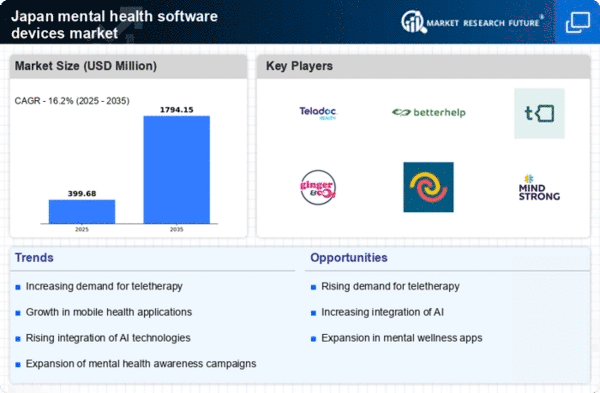Government Support and Funding
Government initiatives aimed at improving mental health services in Japan are significantly influencing the mental health-software-devices market. The Japanese government has allocated substantial funding to enhance mental health care accessibility and quality. This includes investments in digital health technologies that facilitate remote therapy and self-help applications. Recent reports indicate that government spending on mental health services has increased by over 15% in the past few years, reflecting a commitment to addressing mental health issues. Such support not only fosters innovation within the mental health-software-devices market but also encourages collaboration between public and private sectors to develop effective solutions.
Rising Mental Health Awareness
The increasing awareness of mental health issues in Japan is a pivotal driver for the mental health-software-devices market. Public campaigns and educational initiatives have contributed to a cultural shift, encouraging individuals to seek help for mental health concerns. This heightened awareness is reflected in the growing number of users engaging with mental health applications and devices. According to recent surveys, approximately 30% of the Japanese population acknowledges experiencing mental health challenges, which has led to a surge in demand for innovative solutions. As a result, the mental health-software-devices market is likely to expand, with more individuals utilizing technology to manage their mental well-being.
Technological Advancements in Health Monitoring
Technological advancements in health monitoring devices are driving growth in the mental health-software-devices market. Innovations such as wearable devices that track physiological indicators of stress and anxiety are becoming increasingly popular in Japan. These devices often integrate with software applications that provide users with insights and coping strategies based on real-time data. The market for wearable health technology is projected to grow by approximately 20% annually, indicating a robust interest in tools that support mental health management. As consumers become more health-conscious, the demand for such integrated solutions is expected to rise, further propelling the mental health-software-devices market.
Integration of Behavioral Health into Primary Care
The integration of behavioral health services into primary care settings is emerging as a crucial driver for the mental health-software-devices market. In Japan, healthcare providers are increasingly recognizing the importance of addressing mental health alongside physical health. This holistic approach encourages the use of software and devices that facilitate communication between patients and healthcare professionals. Recent studies suggest that integrated care models can improve patient outcomes and reduce healthcare costs by up to 25%. Consequently, the mental health-software-devices market is likely to benefit from this trend, as more healthcare systems adopt technology to streamline mental health services.
Growing Demand for Personalized Mental Health Solutions
The demand for personalized mental health solutions is rapidly increasing in Japan, significantly impacting the mental health-software-devices market. Consumers are seeking tailored applications and devices that cater to their unique mental health needs. This trend is driven by the recognition that mental health is not a one-size-fits-all issue, and personalized approaches can lead to better outcomes. Market Research Future indicates that over 40% of users prefer customized mental health solutions that adapt to their individual circumstances. As a result, developers are focusing on creating more sophisticated algorithms and user interfaces that enhance user experience, thereby fostering growth in the mental health-software-devices market.
















